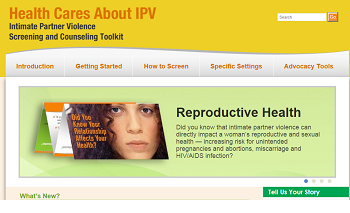IPV Screening and Counseling Toolkit

Puzzled by all the details in new health care laws that benefit millions of women and girls? We’re here to help.
In February of 2013, the U.S. Preventive Services Task Force issued new recommendations to support screening and response to intimate partner violence (IPV) also known as domestic violence (DV) and designated it with a “B” grade – recommending that health plans provide the service. With this and other new coverage requirements for screening and response, addressing DV in the health setting is becoming the standard of care.
This toolkit offers health care providers and advocates for victims the tools to prepare a clinical practice to address domestic and sexual violence, including screening instruments, sample scripts for providers, patient and provider education resources. It also offers strategies for forging partnerships between health care and domestic and sexual violence programs.
Futures Without Violence’s National Health Resource Center on Domestic Violence (HRC) has been supported by the Department of Health and Human Services (DHHS), Administration for Children and Families for over 16 years. In that time, we have created resources to help providers identify and support women and girls experiencing intimate partner violence (IPV). We know that health providers and advocates have limited time to develop the tools to help integrate screening and counseling into their practice, and this toolkit provides resources that can help.
Click here to view the online toolkit.
Learn more about the IPV Screening and Counseling Guidelines in the Affordable Care Act
- Map of State Decisions for Creating Health Insurance Marketplaces
- Recommended Preventive Medicine Service Codes
- Visit our web page on Access to Healthcare for Survivors for more information!
Using Social Media to Increase Awareness
With new national health policy recommendations in support of screening for domestic violence, using social media can support your marketing and outreach for upcoming health and domestic violence trainings or events, or help get the conversation started.
To help health care providers with their online efforts to connect with their patients virtually, Futures Without Violence has developed a graphic: You Are Not Alone. This graphic may be posted via Facebook, Twitter, or texted to patients.





